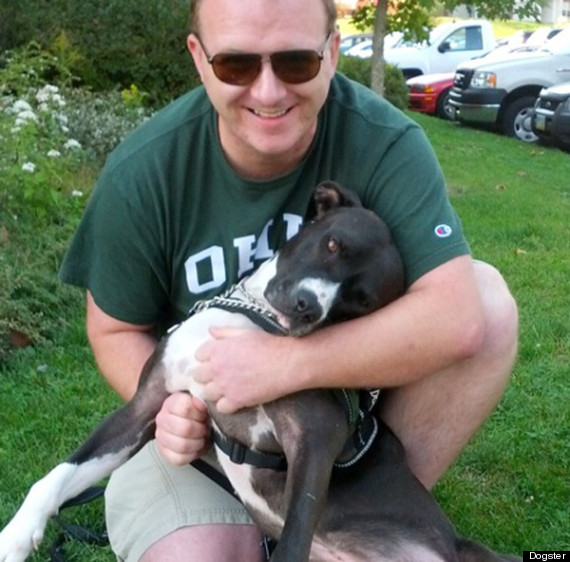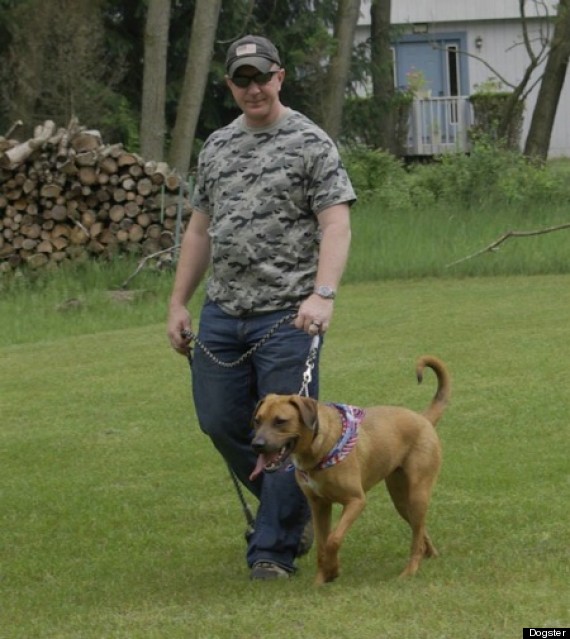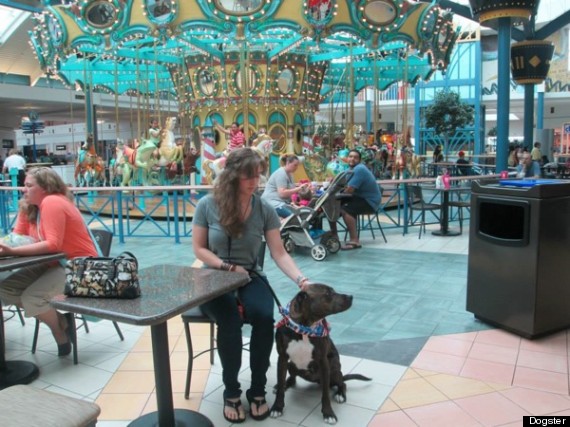By Angela Lutz, Dogster
The black-and-white Pit Bull mix named Major seemed an unlikely candidate for a service dog. Coming from a hoarding situation, Major and more than 20 other dogs were rescued by Detroit Bully Corps, a group dedicated to rescuing and rehabilitating bully breeds. Major had spent most of his life indoors or in cages, not getting the care or socialization he needed to thrive. He was shy and somewhat fearful.
More From Dogster:
10 Things I Learned At My Dog's Wedding (You Read That Right)
The "People Pack" Rescues A Group Of Feral Dogs In East Texas
Do You Love A Breed As Much As I Love The German Shepherd?
But Donna Fournier saw something special in Major. Fournier is the director of training for Stiggy's Dogs, a nonprofit organization dedicated to rescuing and training psychiatric service dogs for military veterans living with post-traumatic stress disorder or traumatic brain injury (TBI). She got a call from Detroit Bully Corps to behavior-test the dogs rescued from the hoarder.
"There isn't a perfect or right breed for the job," Fournier says. "It's more of a personality, temperament, intelligence and compassion factor that makes a service dog. The human handler should always be the most important thing to the dog in any room -- and that cannot be taught. The dog either has it or doesn’t."
Story continues after photo.
Major had just the right temperament for veteran Terrance McGlade. When McGlade met Major, it was love at first sight. But Major had experienced very little of the outside world, and it would take time for him to build his confidence and learn to trust. Fournier was concerned that the match might not work out, simply because Major might not be ready -- and because learning to trust can be challenging for veterans as well.
But McGlade was committed to making it work. He completed weeks of intense training with Stiggy's Dogs before finally taking Major home. According to Fournier, matches like these are beneficial for veterans and dogs alike. Having a dog, she says, can renew the veteran's sense of purpose and help ease the transition back into the civilian world.
"The first thing these dogs do is give peace of mind," she says. "Our veterans have a 'battle buddy' they can rely on again like they had with their brothers in arms. Having a dog gives them a reason to get out of bed in the morning or go outside for a walk. In some cases, they go on to mentor other veterans who are struggling and help them find their purpose again as well."
Stiggy's Dogs was founded by Jennifer Petre in 2010 after the death of her nephew, HM3 Benjamin "Doc Stiggy" Castiglione, in Helmand Province, Afghanistan. Through Stiggy's Dogs, Petre sought to continue her nephew's legacy of caring for men and women in the military.

"Jennifer created a way for our military veterans to receive another way of healing through the use of specially trained service dogs," Fournier says. "Ben's legacy is one of compassion, love, and strength, all of which Stiggy's Dogs strives to uphold."
Since 2009, Stiggy's Dogs has helped change the lives of 23 veterans and rescue dogs. The dogs are trained at the Stiggy's Dogs facility from start to finish, completing a minimum of 120 hours of training. Additionally, the veteran completes a month of training with their new companion before starting a six-month at-home trial period.
Dogs are trained to complete the tasks required by each individual veteran. PTSD services typically include locating an exit, performing perimeter searches, and providing tactile stimulation during emotional overload. TBI tasks might include medication reminders, balance support, picking up dropped items, and hearing support.
According to Fournier, a dog's capacity to provide these services is somewhat rare -- and the most important part is the dog's relationship with the veteran.

"The bond between handler and dog is the most important part of the training," Fournier says. "A dog that is indifferent to human emotions cannot properly manage their handler’s emotional state in times of distress. Only 70 percent of the dogs that start the training program will have the constitution, fortitude, compassion, and intelligence to make it through to be a full-fledged psychiatric service dog."
When a match is made between a dog and a veteran, Fournier says it is usually love at first sight, complete with excited tail wags, kisses, and rolling around on the ground. In a way, the two have already "met" prior to their introduction. Stiggy's Dogs asks each veteran to send a shirt they've slept in for a few days so their dog can learn their scent, and the veteran has been watching the dog's training progress via Facebook.
"Watching the dog and veteran bond and become a solid team is incredible," Fournier says. "The change in the dog -- going from shelter/rescue life to being a working dog in public and getting to be with their human all the time and everywhere ... what could make a dog happier? The change in the human -- going from entering this program with skepticism, mistrust, and introversion to being a confident, engaging, and trusting person again -- that is just phenomenal."
